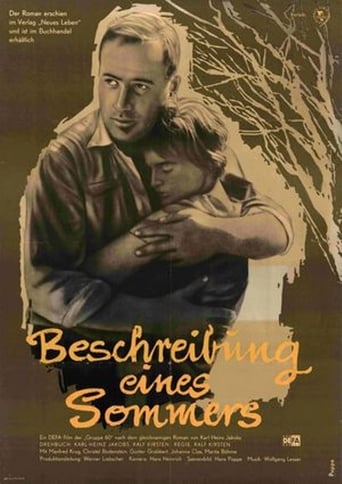



Purely Joyful Movie!
Mostly, the movie is committed to the value of a good time.
View MoreThis is ultimately a movie about the very bad things that can happen when we don't address our unease, when we just try to brush it off, whether that's to fit in or to preserve our self-image.
View MoreThe film may be flawed, but its message is not.
In the late fifties a large industrial complex was built near Schwedt, in the GDR. This low budget film tells about the voluntary participation of the brigades of the Freie Deutsche Jugend in the building up, and as such belongs to the so-called Aufbau films. The FDJ was an organization similar to the YMCA, so the youth affiliate of there the Bolshevist Party. The boys and girls are strongly motivated to build a new socialist society, but they lack the skills and knowledge. This is remedied by Tomas Breitsprecher (played by the famous actor Manfred Krug, who was also a jazz player), an experienced civil engineer. However, Tom is not really a textbook character, and in particular has a bad reputation with women. Besides, he has never joined the party. Nevertheless, the construction proceeds rapidly, even though a bush fire temporarily has a devastating effect. Tomas has several collisions with Sigrit, the local FDJ secretary (played by Christel Bodenstein, apparently also a well-known actress), but this soon turns into a love affair. It becomes clear that the early marriage of Sigrit with another party member has been a mistake. The romance between Tom and Grit unfolds rather secretly in the fields and in an attic room. However they ascertain their mutual dedication, and it seems sincere. Since the film ends together with the summer, the final outcome of the affair remains unknown to the viewer. Marriage was by no means sacrosanct in the GDR. A large part of the film is devoted to the dialogs between Tom and Grit, in short phrases (Do you love your man? Yes. Does he love you? Yes. Doe you have children? No. Do you love your man? :silence:). I guess the texts merit a careful analysis, which I have unfortunately omitted up till now. For me the intriguing part of the film is the sketch of the party life in those first GDR years, since it shows the attitude that the state tried to promote among their people. Already the Soviet Union had its Subbotniks, workers doing voluntary overtime. In the Bolshevist philosophy, he workers should be willing to exploit themselves, and would experience their work as a fulfillment, or at least a dire need. Interestingly the rubble women in the GDR, who cleaned up the debris caused by the allied bombardments, did their job unpaid. On the other hand, the women in the FRG (western Germany) were recompensed for the same work. At first sight, the voluntary activity seems sympathetic. On closer examination, it can hardly have been really voluntary, and was based on social pressure, or at best on manipulation. In addition, volunteers seldom act in a professional and efficient manner. In the end, it is probably best to give any decent work performed a fair pay. With this bold remark I end my rather indecent review.
View More"Description of a summer" tells a story about love, though without any romance or sentimentality. A group of youth activists are in charge to build parts of a chemical factory. As they aren't exactly experienced with things like mixing concrete, engineer Tom Breitsprecher (Manfred Krug) tries to teach them - and encounters party secretary Grit (Christel Bodenstein). The two get slowly into a fatal attraction - fatal, because she is married. The scene where Tom takes off Grit's ring (for workplace safety reasons, he says) has a strong symbolism."Only" black and white, this film brings an abundance of thrilling visuals, mostly using light and shadow effects, and more symbolic scenes - for instance, the burning of a staff barrack is just indicated by what happens to a guitar and a bicycle. Another thing it doesn't have is closing titles - and indeed, "The End" would have been inappropriate in the end. I felt like "Discuss." might have been a fitting end title...45 years after this film came out, in a GDR just having been sealed to the West with the Wall, it still feels fresh and surprising today. Don't expect a well-rounded story arc, what you get is a slice of the life of the two main actors, and quite some food for thought. But no political propaganda.
View More